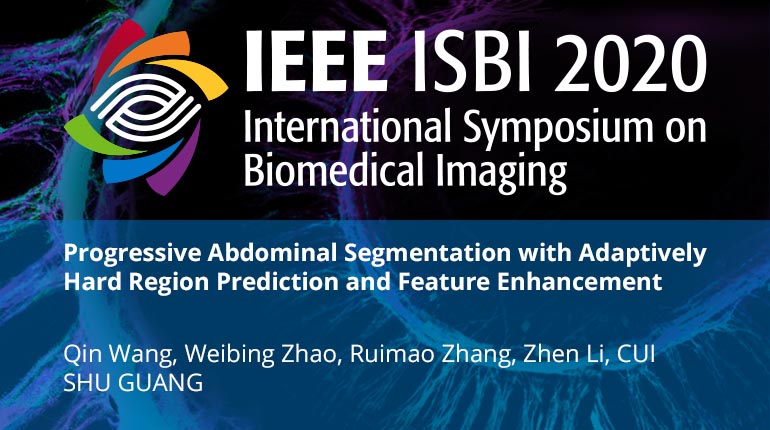
Already purchased this program?
Login to View
This video program is a part of the Premium package:
Progressive Abdominal Segmentation with Adaptively Hard Region Prediction and Feature Enhancement
- IEEE MemberUS $11.00
- Society MemberUS $0.00
- IEEE Student MemberUS $11.00
- Non-IEEE MemberUS $15.00
Progressive Abdominal Segmentation with Adaptively Hard Region Prediction and Feature Enhancement
Abdominal multi-organ segmentation achieves much attention in recent medical image analysis. In this paper, we propose a novel progressive framework to promote the segmentation accuracy of abdominal organs with various shapes and small sizes. The entire framework consists of three parts: 1) a Global Segmentation Module extracting the pixel-wise global feature representation; 2) a Localization Module adaptively discovering the top-n hard local regions and effective both in training and testing phase; 3) an Enhancement Module enhancing the features of hard local regions and aggregating with the global features to refine the final representation. Specifically, we predefine 512 region proposals on the cross-sectional view of the CT image to generate coordinates pseudo labels which can supervise Localization Module. In the training phase, we calculate the segmentation error of each region proposal and select the eight ones with the lowest Dice scores as the hard regions. Once these hard regions are determined, their center coordinates are adopted as the pseudo labels to train the Localization Network by using Manhattan Distance Loss. For inference, the entire model directly accomplishes the hard region localization and feature enhancement to promote pixel-wise accuracy. Without bells and whistles, extensive experimental results demonstrate that the proposed method outperforms its counterparts.
Abdominal multi-organ segmentation achieves much attention in recent medical image analysis. In this paper, we propose a novel progressive framework to promote the segmentation accuracy of abdominal organs with various shapes and small sizes. The entire framework consists of three parts: 1) a Global Segmentation Module extracting the pixel-wise global feature representation; 2) a Localization Module adaptively discovering the top-n hard local regions and effective both in training and testing phase; 3) an Enhancement Module enhancing the features of hard local regions and aggregating with the global features to refine the final representation. Specifically, we predefine 512 region proposals on the cross-sectional view of the CT image to generate coordinates pseudo labels which can supervise Localization Module. In the training phase, we calculate the segmentation error of each region proposal and select the eight ones with the lowest Dice scores as the hard regions. Once these hard regions are determined, their center coordinates are adopted as the pseudo labels to train the Localization Network by using Manhattan Distance Loss. For inference, the entire model directly accomplishes the hard region localization and feature enhancement to promote pixel-wise accuracy. Without bells and whistles, extensive experimental results demonstrate that the proposed method outperforms its counterparts.
 Cart
Cart Create Account
Create Account Sign In
Sign In





